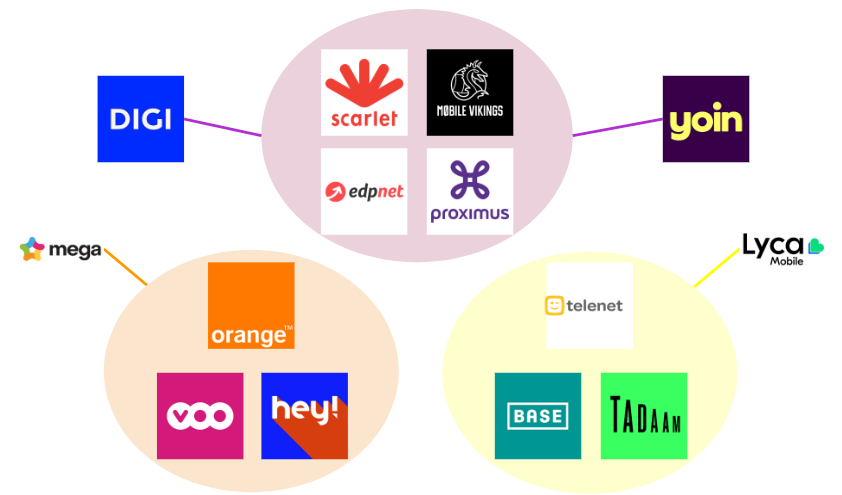Summary:
Behind the apparent diversity of telecom providers in Belgium, three major groups dominate. Around them revolve a few independents who rent access to their networks. Understanding these links helps you make an informed decision - not only based on price and options, but also on network quality and the type of company you want to support.
Who is behind the telecom operators in Belgium?
When looking for a mobile or internet subscription in Belgium, people usually think of familiar names like Proximus, Orange, or Telenet. But behind these well-known brands are sometimes other players, less visible, yet tied to them. Mobile Vikings, Hey! Telecom, BASE, Scarlet, or even Lycamobile may look like competitors but they sometimes share the same networks or belong to the same group.
The Belgian telecom market is a landscape where three large companies dominate and where independent operators play a more discreet role. Understanding this structure will help you choose your provider with confidence and avoid common misconceptions.
Common misconceptions about operators and their networks
Before comparing offers, it is useful to clear up some frequent misconceptions:
- All Belgian operators use the same network.
False. While some independent operators lease the network of major groups like Proximus, Orange, or Telenet, each main operator has its own network, and coverage can vary by region.
- Lower prices mean lower network quality.
Not always. Independent operators can offer very competitive rates while using the same network as the major operators. The difference is mainly in the included services or the flexibility of the plans.
- Independent operators are less reliable.
False. They rely on a major operator's network, so connection quality is often identical. The difference is mostly in the customer experience and additional services offered.
- Independent brands are not secure.
False. They follow the same security standards as major operators, since they use their network and infrastructure.
- 5G is available with all operators.
Not true. Some independent operators only offer 4G, even if the host operator provides 5G. It is therefore important to check the available technology when comparing plans before subscribing.
A market dominated by three main groups
In Belgium, mobile telephony, fixed internet, and television are largely controlled by three major actors: Proximus, Orange Belgium, and Telenet. These companies own several affiliated brands targeting different customer profiles.
Proximus, the historic operator, covers the whole country and provides a full range: internet, TV, mobile services, and landline. But it doesn't operate only under its main name: Scarlet is its “budget” label, designed for those who want the essentials at a lower price. Since 2021, Mobile Vikings has joined the group, keeping its youthful image and generous data plans. In 2023, Proximus also acquired Edpnet, known for transparent pricing and flexibility.
Orange Belgium, a subsidiary of the French Orange group, long focused on mobile. But with the purchase of VOO in 2023, it also established itself in fixed internet and cable TV in Wallonia and Brussels. Hey! Telecom, originating from VOO, complements the portfolio with a 100% digital approach and eco-friendly commitments aimed at younger audiences.
Telenet, mainly active in Flanders, is owned by Liberty Global. It provides internet, mobile, and TV subscriptions via cable and owns the BASE network, well-known for attractive mobile formulas. Tadaam, its innovative brand, offers internet and TV entirely without cables, using the BASE mobile network.
Independent operators: fewer than you might think
Next to these giants, a few independent providers exist. They don't own a national network but rent infrastructure from the big players (known as MVNOs, Mobile Virtual Network Operators).
Among them:
- Lycamobile: Mainly aimed at customers who want low-cost international calls. This operator uses the Telenet network to provide its services.
- Yoin: Offers simple and affordable mobile plans, relying on the Proximus network.
- Mega: Originally from the energy sector, it diversified into mobile subscriptions. Mega depends on the Orange network for its services.
- Digi: A new entrant focusing on highly competitive prices to attract customers. It uses the Proximus network for its mobile offering but is limited to 4G.
Here's an overview of how Belgian telecom groups, their brands, and independent operators are connected:

Why so many brands?
The multiplication of brands is no coincidence. It's a marketing strategy to segment the market:
- A premium brand (complete offers, high-end services).
- A budget brand (reduced prices, limited services).
- A specialized brand (youth-oriented, simple mobile offers, cable-free internet).
This allows a group to cover different customer profiles more effectively while relying on the same network infrastructure.
Same networks, different offers
It's important to realize that several brands share exactly the same network. That means the technical quality (speed, coverage, reliability) will be similar for a comparable subscription — even if prices differ.
For example: Mobile Vikings, Scarlet, and Proximus all use the Proximus network. Hey! Telecom and VOO rely on Orange's network. For fixed internet, some independents use the lines of Proximus or VOO to deliver their services.
Impact for the consumer
Knowing these affiliations allows you to:
- Evaluate the real quality of the network before subscribing.
- Understand that some operators are not truly competitors but part of the same parent group.
- Compare on the right criteria: price, customer service, included options, and flexibility.
